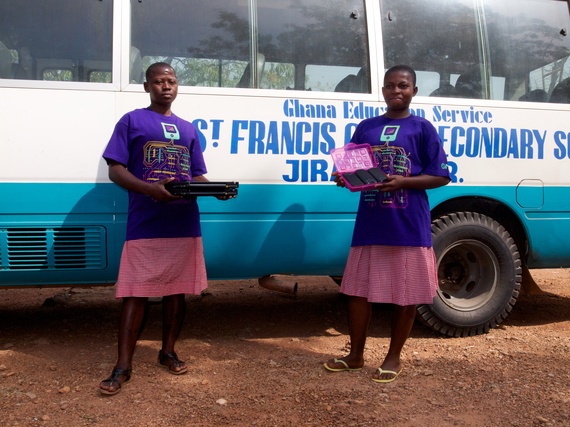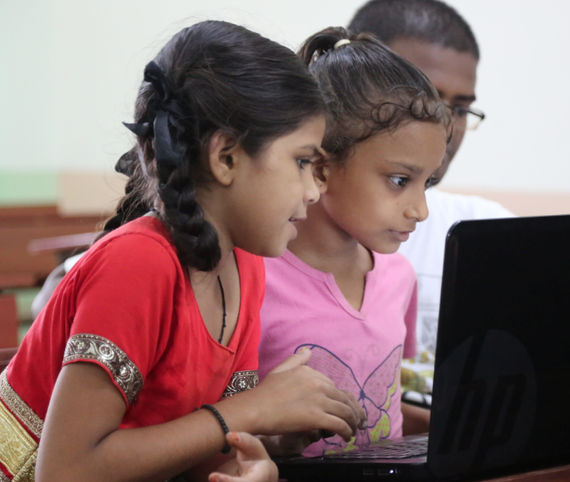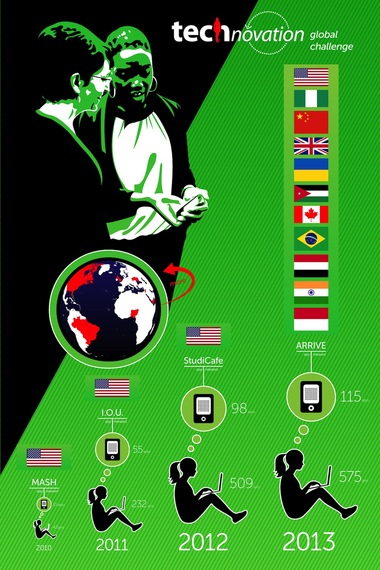Editor's Note: This post is part of a series produced by HuffPost's Girls In STEM Mentorship Program. Join the community as we discuss issues affecting women in science, technology, engineering and math.
What do Pinterest, Uber and Instagram have in common? They were created by men from Silicon Valley. What would happen if girls from around the world created apps? To solve problems that they saw in their communities?
You would get these: An app to help Nigerian policemen rapidly submit traffic offenders' information through their phone, an app to educate girls about teenage pregnancy, an app to virtually dissect frogs, to measure blood pressure AND Pinterest, Uber and Instagram!

Teenage girls are some of the most active users of mobile phones. But they don't see themselves as inventors of technology. They do not interact with mobile technology and think "I can build something better". Girls are regularly exposed to messages that reinforce the stereotype that programming is innately "for boys" -- from the way media and film portray members of the profession, to gendered toys that exclusively market engineering and building-related toys only to boys. While this is a complex issue with outliers and variances, the majority of messages that girls are exposed to reinforce the incorrect stereotype that computer science and technology is not a career option for women.
Technovation Challenge is the largest global technology entrepreneurship program for girls. Participants work with professional mentors to research, design, build, and launch mobile apps that solve real problems in their communities over the course of 3 months. Technovation was created to inspire girls be the next generation of innovators and problem solvers using technology.
Over the past four years Technovation has introduced 1,374 girls worldwide to programming and entrepreneurship. Data from 2011 shows that 94 percent of participating girls believe a technology career is good career for women and 75 percent of participating girls are more interested in working in a career in technology.
From the start, our vision was to introduce thousands of girls worldwide to technology and entrepreneurship and bring a completely new and diverse set of inventors onto the playing field.
We have learned a lot about the core components of creating a long running, high-touch, scalable program. These are:
* Girls need to work in all girls teams for the greatest gains in confidence and learning
* High quality curriculum can be delivered through technology platforms (instead of through in-person instructors)
* Programming alone is not going to be enough to retain girls through a 3 month program. Girls need to solve a pressing problem and see themselves as the agents of change. The combination of programming and entrepreneurship is what causes a shift in perspective. Girls realize that they can be problem solvers, inventors.
"[I learned] how to make apps, that not all computer people are geeks, [and that] you can have fun while doing something to further your education." - Technovation alumni
"Before the Technovation Challenge I was not even aware that there existed majors in technology and now I am a second year at the University of California, Irvine majoring in Computer Science." - Kenia Rioja

The Technovation curriculum follows this outline each spring:
* Week 1: Introduction: Teams meet their mentors, work on basic App Inventor tutorials and begin brainstorming app ideas.
* Week 2: Market Research: Teams learn about basic market research and customer development and survey techniques. Teams create a basic app prototype plan and learn about conditionals and logic statements.
* Week 3: User-Centered Design: Teams learn about the concepts of lists and loops, they perform usability testing of competitor apps and complete paper prototyping to explore user interface and the prototyping life cycle.
* Week 4: Incorporating Feedback: Teams of girls learn how to constructively incorporate user feedback into their overall app design. Teams also learn about database functions and database-related concepts like keys and values. With paper prototyping nearing completion, girls prepare to build their app prototype.
* Week 5: Entrepreneurship: Teams learn about the basics of a profitable business model, including value propositions, market size, revenue streams, cost structure and distribution channels. Teams examine existing businesses to discuss these concepts in real-world applications and begin creating their prototype business model.
* Week 6: Business Planning: Teams learn the basic components of a business plan, including executive and company summaries, product descriptions, market analysis, strategy and implementation planning and financial analysis. Teams begin writing their business plan while adding functionality to their prototype apps.
* Week 7: Career Exploration: girls talk to their mentors about what it is like to work as a tech professional, and explore a variety of girl-centric career resources. Teams complete their business plan.
* Week 8: Pitch Materials: girls learn how to craft a compelling slide deck and presentation, practicing their presentations with peers. They also continue building the functionality of their prototype app.
* Week 9: Project submission: girls prepare their project for submission by addressing each required component. They also use this week to troubleshoot any prototype development issues.
* Week 10: Effective Presentations: Girls learn how to deliver effective and compelling presentations; prototypes are finalized and girls prepare their pitch.
* Week 11: Pitch Coaching: Mentors and teachers work with teams to improve their pitch; girls film pitches or prepare to attend regional pitch nights where they demonstrate their prototype and business plans.
* Week 12: Reflection and Wrap-up: Teams submit their final materials, reflect on the three-month program and complete assessment post-surveys. Regional winners are chosen by judging panels.
World Pitch Night: Finalists are announced, and they travel to World Pitch Night hosted at a tech company in Silicon Valley. Top teams demo projects and pitch live to a panel of expert judges; the winning team is selected and awarded $10,000 to complete their prototype app and take it to market.
Over the past four years, the Technovation girls have invented hundreds of innovative mobile app prototypes.

Our three year goal is to engage 10,000 girls worldwide and bring a completely new and diverse set of inventors and problem solvers onto the technology stage.
There is much talk about the lack of women in technology and leadership. As Susan Faludi correctly points out, platitudes will not change the reality. There are some very concrete steps that the technology community can take to change the status quo:
* build a strong base - invest significant amounts in programs that bring technology and computer science education to girls. It takes a lot of resources to move humans far outside their comfort zone. It cannot happen through "viral videos". It happens through blood, sweat and tears - and slowly.
* retain your star players - provide professional development opportunities for women employees and reward them for learning.
We strongly believe that we need to invest in the future so that it will look different from today.
"I want every girl and every woman to have that confidence that they can lead, that they can create something out of nothing." - Dr. Anu Tewary, Technovation Challenge Founder